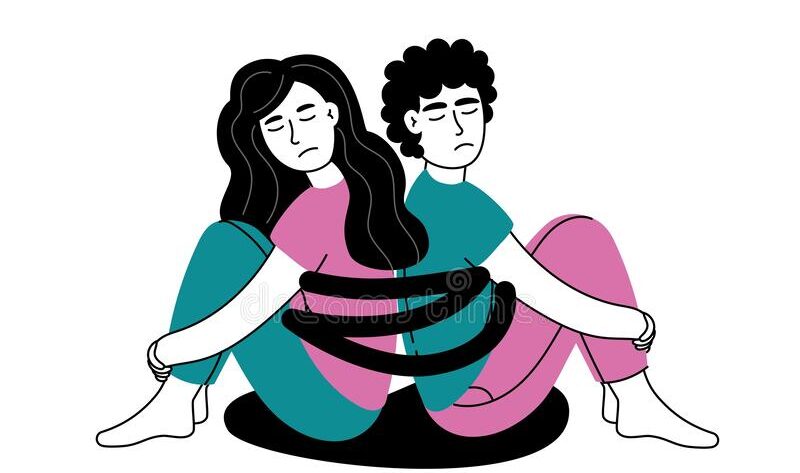Relationships are often complex, but those involving codependents and narcissists can be particularly challenging to navigate. Codependent individuals are people who prioritize the needs and desires of others over their own, while narcissists are individuals who have an inflated sense of self-importance and a deep need for admiration.
When these two personality types collide, it can result in a toxic and manipulative dynamic that is difficult to break free from. In this article, we will explore the characteristics of both codependents and narcissists and delve into the dynamics that exist between them.
By gaining a deeper understanding of these relationships, we can begin to identify unhealthy patterns and work towards creating healthier, more balanced relationships in the future.
What Does Being Codependent Mean?
Codependency is a type of dysfunctional behavior in a relationship where one person has an excessive emotional or psychological reliance on another person. The codependent individual often feels responsible for meeting the needs and wants of their partner, to the point where they may neglect their own needs or feelings in the process.
Codependency can occur in any type of relationship, including romantic relationships, friendships, or even between a parent and child. People who exhibit this type of behavior tend to carry it with them within many relationships in their lives.
The behavior of codependency often stems from a variety of factors, including childhood experiences, family dynamics, and personality traits. Many codependent individuals grow up in dysfunctional households where emotional needs are not met, and they may learn to prioritize the needs of others over their own as a coping mechanism.
Codependent behaviors can lead to patterns of seeking validation and approval from others, often at the expense of their own well-being.
Additionally, some individuals may have personality traits that make them more susceptible to codependent behavior, such as low self-esteem, a need for control, or a fear of abandonment. These traits can make it difficult for codependent individuals to set boundaries or assert their own needs, which can further perpetuate the cycle of codependency.
Ultimately, codependency is a complex and nuanced issue that can have a significant impact on an individual’s emotional and psychological well-being. It is important for individuals who struggle with codependency to seek out support and resources in order to break free from unhealthy patterns and develop more balanced, fulfilling relationships.
What Is Narcissism?
Narcissism is a personality trait characterized by an excessive sense of self-importance, a deep need for admiration, and a lack of empathy for others. Narcissistic individuals often have an inflated sense of their own abilities, accomplishments, and intelligence, and they may feel entitled to special treatment or privileges.
They may also have a grandiose and unrealistic view of their own talents and achievements.
While narcissism is not always a diagnosable mental health disorder, individuals who exhibit a pattern of narcissistic behavior can have a significant impact on the emotional and psychological well-being of those around them, particularly in intimate relationships or family dynamics.
Narcissistic individuals may engage in manipulative or exploitive behavior in order to maintain their sense of superiority and control over others. They may be highly critical of others, and may have a tendency to blame others for their own shortcomings or mistakes.
It’s worth noting that there is a distinction between healthy self-esteem and pathological narcissism. Healthy self-esteem is an important aspect of overall well-being, and involves having a realistic and balanced view of oneself. Pathological narcissism, on the other hand, is characterized by an excessive and distorted sense of self-worth, and can have a negative impact on both the individual and those around them.
5 Indications If You Decide You Need To Leave The Codependent /Narcissist Relationship
Leaving a relationship can be a difficult decision for anyone, but it can be particularly challenging for a codependent person who is in a relationship with a narcissist. Understanding The Relationship Between A Co-Dependent And A Narcissist: 5 Indications You Should Run Away Immediately
- Constant criticism: If the narcissistic partner is constantly criticizing the codependent partner and making them feel inadequate, this can be a sign that the relationship is unhealthy and emotionally abusive.
- Lack of empathy: Narcissists often lack empathy for others and may disregard the needs and feelings of their partners. If the codependent partner feels like their emotions and needs are consistently dismissed or invalidated, it may be time to consider leaving the relationship.
- Manipulation and control: Narcissists may engage in manipulative behavior in order to maintain control over their partners. If the codependent partner feels like they are constantly walking on eggshells or being manipulated into doing things they don’t want to do, it may be a sign that the relationship is unhealthy.
- Unhealthy power dynamics: In a codependent-narcissist relationship, the power dynamic is often skewed towards the narcissist. If the codependent partner feels like they are constantly giving more than they are receiving and that their partner holds all the power in the relationship, it may be time to re-evaluate the relationship.
- Loss of self-identity: Codependent individuals often prioritize the needs of their partners over their own, but in a relationship with a narcissist, this can result in a loss of self-identity. If the codependent partner feels like they have lost touch with who they are and what they want out of life, it may be a sign that the relationship is no longer serving their best interests.
In conclusion, it is crucial to recognize the red flags in a relationship with a co-dependent and a narcissist. While co-dependents may enable the narcissist’s toxic behavior, the narcissist may manipulate and control the co-dependent.
If you notice any of the five indications discussed in this article, it is time to run away immediately. Remember that you deserve a healthy and fulfilling relationship that is built on mutual respect, trust, and love. Take care of yourself and seek professional help if needed.










